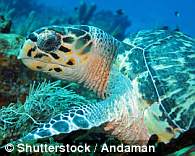Sea turtles use their flippers like HANDS to karate-chop jellyfish, play with their food and lick their ‘fingers’ after eating
Flippers aren’t just for swimming, they are also used as tools by sea turtles to attack and hold their prey, according to Daily Mail.
Scientists have discovered that these creatures have evolved to use their flippers like hands, allowing them to karate-chop jellyfish.
They can also use their flippers to play with their food, grasp coral to eat the sponge clinging to its surface, and even ‘lick’ their fingers after eating.
These movements were previously thought to be too advanced for the small brains of the sea creatures.
Researchers trawled the web for images of the creatures.
By analysing these pictures the scientists discovered surprising levels of nimbleness.
The researchers said this was unexpected, due to their tiny reptilian brains being considered too small to co-ordinate such complicated motion.
Dr Kyle Van Houtan, science director, who co-led the research, said: ‘Sea turtles don’t have a developed frontal cortex, independent articulating digits or any social learning.
‘And yet here we have them ‘licking their fingers’ just like a kid who does have all those tools.
‘It shows an important aspect of evolution – that opportunities can shape adaptations.’
The pictures used in the study revealed that turtles can use their flippers to karate-chop jellyfish, roll scallops along the seafloor and grasp coral while ripping loose an anemone.
These activities were grouped into a list of eight general uses of flippers, outside of swimming.
Similar behaviour has also been observed in marine mammals with flipper-like limbs such as walruses, seals, manatees and sea otters.
The findings provide insights into the evolution of four-limbed sea creatures and raise questions about ‘nature or nurture’ – which traits are learned and which are hard-wired from birth.
Dr Van Houtan added: ‘We expect these things to happen with a highly intelligent, adaptive social animal.
‘With sea turtles, it’s different. They never meet their parents; they’re never trained to forage by their mom.
‘It’s amazing that they’re figuring out how to do this without any apprenticing, and with flippers that aren’t well adapted for these tasks.’
N.H.Kh

